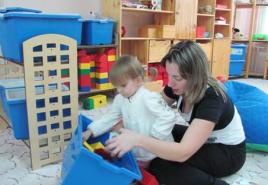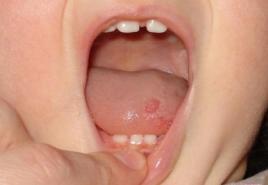If the child has bitten his tongue hard. How to treat if you bit your tongue
Childhood injuries are not uncommon, as babies are active and inquisitive. And therefore, mothers should know how to provide first aid for various problems, for example, if the baby bites his tongue so hard that blood begins to flow out of it.
Causes
Most often, a child bites his tongue when falling, for example, if he slipped while running. The baby can injure the tongue when learning to crawl or stand up. Also, such injuries are possible with accidental blows to the face, for example, if a child is hit by a ball. You can also bite your tongue when riding on a swing - when the swing takes off very high and then drops sharply downward, the child's jaws can clench, and the tongue gets between them.
Sometimes children bite their tongues while eating, when they bite off a product or actively chew it.
Tongue injury is also possible due to jaw defects or improper tooth growth. Another reason for biting the tongue to blood is an epileptic seizure. If a child suffers from such a disease, it is important for parents to know how to act correctly during an attack in order to prevent injury to the tongue.
How to understand that a baby has bitten his tongue
With such an injury, the child will complain of pain in the tongue, so the mother should carefully examine the wound.
To do this, you should use the light (if the damage did not occur during the day, then the light of a lamp or flashlight can be directed to the tongue), asking the daughter or son to open her mouth and stretch her tongue forward to the maximum. You will notice a fresh wound that is bleeding.
If the very moment of the injury was overlooked, the child's complaints about soreness while eating sour or hot food can tell about the trauma of the tongue. When viewed at the site of the bite, a hematoma or swelling may be found.
 Tongue injured after a bite reacts painfully to certain types of food
Tongue injured after a bite reacts painfully to certain types of food
How to help a child
The child can bite the tongue from any side - from above, and from the side, and from below. Especially severe bleeding is possible with an injury to the lower part, because many blood vessels pass through it.
If the baby complains of pain in the tongue and you notice a slight bleeding injury, you need to take the following measures:
- First of all, reassure the baby, because most children are afraid of the sight of blood, and biting the tongue is often very painful.
- If a child bites his tongue while eating, rinse his mouth first and then apply a tampon to the wound.
- You need to stop the blood using a tampon made of a sterile bandage folded in several layers. If there is no bandage nearby, you can press the wound with a clean handkerchief.
- When biting the upper part of the tongue, the bandage is pressed against the palate.
- If the tongue is damaged from the side, the swab from the bandage is pressed against the gum, and when the tip is biting, it is pressed against the teeth.
- If the child has bitten his tongue from below, put the tampon under the tongue, and press on the tongue from above with a finger or spoon.
- The tampon should be replaced with a clean one as needed and held in the mouth until the bleeding stops.
- Applying ice or other cold object to the damaged tongue helps to stop bleeding. It is advised to wrap the ice cube in a clean bandage.
- When the bleeding has stopped, the wound should be disinfected. For this, it is optimal to use hydrogen peroxide, and the use of brilliant green or iodine is not recommended (such funds can burn the mucous membrane). It is permissible to use methylene blue or chlorhexidine.
- For severe pain, you can use an anesthetic gel, which is used in teething babies. You can also give paracetamol, taking into account the age of the child when choosing a dosage.
- After biting the tongue, you should postpone eating for several hours, and sour and hot should be abandoned for at least 5 hours, since such food will only increase the painful sensations.
When the tongue heals from the bite, a whitish-gray coating will appear at the site of the wound. You do not need to remove it, since such a protective film will disappear on its own in a few days. To prevent complications after a tongue injury, a child should rinse his mouth with herbal decoctions, for example, chamomile, sage, oak bark, St. John's wort. You can also apply a cut aloe leaf to the site of injury.
 To avoid complications after a tongue injury, lotions and rinse your mouth should be done
To avoid complications after a tongue injury, lotions and rinse your mouth should be done
When to see a doctor
In some cases, after biting the tongue, the child should be immediately taken to a medical facility:
- If the site of injury is severely swollen or a large hematoma has formed on it.
- If within 20-30 minutes the bleeding from the bitten tongue does not stop.
- If the wound is very long (more than 0.5 cm long) or very deep, as well as with uneven bleeding edges.
- If part of the tongue is bitten off (even if it is tiny).
- If the pain is severe and the discomfort increases over time.
- If suppuration occurs at the site of biting.
A child with a tongue bitten to blood should be shown to a traumatologist, and if the wound is extensive and deep, the child will be sent from traumatology to surgery.
 Even with a slight injury to the tongue, be sure to consult a specialist
Even with a slight injury to the tongue, be sure to consult a specialist
Probably, every person at least once in his life faced such a problem as a bitten tongue. This can happen both during meals and during a conversation. Acute pain immediately occurs, which decreases in intensity over time. What to do if you bit your tongue to speed up healing, see the article for more details.
First aid
If the question arose about what can be done if the tongue was bitten, then most likely there is significant damage and severe pain. A small wound heals in a fairly short time and does not bother the person in any way. Deep injuries are accompanied by pain and bleeding.
Biting the tongue in children requires an urgent visit to a specialist in order to prevent dangerous consequences. Do not let the pain out of your attention and hope that it will disappear on its own. Due to the child's not yet formed immunity, an infection can easily penetrate into the damaged tissue and spread further through the body with the blood flow. The doctor will be able to properly treat the wound and prescribe further treatment.
If it is impossible for one reason or another to visit a doctor, you can provide first aid at home. In most cases, at this stage, therapy ends, and further visits to a specialist are no longer required.
If bleeding occurs after biting heavily on the tongue, you should try to stop it. To do this, use pressure: press the tongue to the palate or gum.
Important! To reduce the intensity of the inflammatory process and to suspend the release of blood, you can use a cold compress. An ice cube from the freezer is perfect.
To calm the child and reduce the intensity of the pain syndrome, you can use a solution of Lidocaine, in which a cotton swab is moistened and applied to the injured area. You don't need to apply too much lidocaine. Otherwise, irritation will arise. In addition, it is necessary to ensure that the child does not accidentally swallow saliva with the drug until it is absorbed into the tissue.
In some cases, suturing is required, which can only be done by a specialist. Self-medication is not recommended.
Medication
How to treat a wound from biting the tongue after first aid, only a doctor can tell. As a rule, medications are prescribed that promote rapid healing, elimination of pain and swelling:
- solcoseryl paste is an excellent drug for getting rid of the inflammatory process, accelerating the regeneration of injured tissues, preventing the addition of secondary infections (apply up to 5 times a day to the damaged area until complete healing);
- metrogyl gel includes chlorhekidine and metronidazole in the substance, which effectively cope with pathogenic microorganisms and inflammatory processes (apply up to 3 times a day for 7 days);
- hydrogen peroxide is a simple and affordable remedy used for wound healing and antiseptic treatment after biting the tongue (dilute with water in equal parts and rinse the mouth up to 2 times a day).
If a child has bitten his tongue, in this case, compresses with hydrogen peroxide can be applied to the injured place by moistening a cotton swab in the product.
Food
If a person has bitten his tongue, he will probably be bothered by pain. This also affects food intake. For this reason, hot food should be excluded from the diet, because high temperature slows down recovery and, moreover, increases the intensity of pain. This also applies to cold foods, which work in the same way as hot foods.
It is imperative to replenish the diet with vitamins, which help to strengthen the protective function of the body, thereby accelerating recovery. For example, products containing vitamins C and B will be useful: fresh vegetables, citrus fruits, herbs, meat, etc. You can also buy ordinary ascorbic acid in the form of sucking tablets at the pharmacy.
Citrus fruits are a natural source of vitamin C. They help increase the body's resistance to infections
Folk remedies
After you have bitten your tongue, you can begin to carry out therapy with folk remedies, from which medicinal decoctions and infusions are prepared:
- salt: 1 tbsp l. water for 1 tsp. salt, stir and rinse after meals;
- hydrogen peroxide: dissolve soda in water in equal volumes, rinse your mouth with a ready-made product after eating;
- milk of magnesia and the preparation Benadryl: mix the ingredients in equal parts, rinse the mouth with the prepared product after eating.
You can get rid of a wound with the help of honey, which has an antiseptic effect, helps to envelop the mucous membrane, thereby preventing its irritation and the reproduction of pathogenic microorganisms. Another natural antiseptic is turmeric powder. You can add a pinch of turmeric to honey and apply the mixture to the wound.
How to speed up wound healing
After the disappearance of the pain syndrome and stopping bleeding, special measures can be taken to help speed up recovery and quickly restore damaged tissue:
- brushing your teeth daily and rinsing your mouth thoroughly after brushing (this will help prevent wound infection);
- daily rinsing of the mouth with infusions and decoctions of medicinal herbs (for example, chamomile);
- instead of infusions and herbal decoctions, you can take any antiseptic drug (for example, Furacilin).
- if after biting the tongue 5 days have passed, and the wound still does not heal;
- if after 2-3 days the wound began to grow;
- if a blue hematoma has formed at the bite site;
- if puffiness has formed in the place of the bite;
- when severely injuring: biting through the tongue, biting off the tip, etc.
Prohibited actions
After biting the tongue, it is strictly forbidden to treat the tongue with antiseptic drugs such as brilliant green and iodine. In most cases, the products cause burns to the mucous membrane and irritation. It is not recommended to use hot solutions, infusions and decoctions for rinsing. The liquid should be at the optimum temperature - slightly warm.
Important! Inflammation can occur when dirt enters the wound. In this case, bacterial microorganisms penetrate into it, which cause the infectious process.
It is also not recommended to apply pressure to the injured area. Otherwise, the inflammatory process intensifies.
It is forbidden to self-medicate with antibacterial drugs. Such potent agents should be prescribed by a specialist, taking into account the peculiarities of the course of the inflammatory process.
Although biting the tongue rarely causes dangerous consequences, you should not miss the unpleasant symptoms that arise, but you need to see a doctor. He will carefully examine the wound and prescribe the most effective therapy.
Children are little fidgets, and there are often situations when a child bites his tongue, lip or cheek. This usually occurs during active games with other children or while eating, but there is also trauma to the tongue through bite at night in a dream. In this article, we will figure out how to help yourself or your baby if he has bitten his tongue, how to provide first aid, when you need to see a doctor.
Why do adults and children bite their tongues?
Active lifestyles and dynamic play (the child can be injured by being involved in them) are the main causes of this unpleasant injury in children. Active play with peers can lead to the fall of the baby, because of which his teeth close, and his tongue bites. In addition, you can get injured even when swinging violently on the swing. Boys often have fights, as a result of which they can hit each other in the jaw, which leads to injury.
Adults often bite their tongues for the same reasons: an active lifestyle, strength training, during which there is a mechanical effect on the jaw part of the face. Stress is another cause of biting. The person begins to "grit his teeth" and injures his tongue (we recommend reading: why children grind their teeth in their sleep: explanation of Dr. Komarovsky).
A bite at night in a dream is also a common disease. It occurs in both adults and children. Many people ask the question: "Why do I constantly bite at night?" The factors provoking this phenomenon can be a state of stress, vitamin deficiency, dental problems, or just a bad habit. This means that the root cause will have to be treated, and only after that, most likely, the habit will go away.
The consequences of a strong bite
At the time of the bite, the mucous membrane is damaged, and a small ulcer appears at the site of the injury. It does not require serious therapy and should go away on its own over time. Of course, the ulcer causes inconvenience when eating and talking, but this is temporary, you will have to endure a little.
Much more serious is the situation when the baby has seriously bitten or bit through the lingual muscle. The wound in this case brings discomfort while eating, interferes with normal conversation and constantly hurts. The child becomes whiny and capricious, complains of pain. Do not hesitate, start treatment immediately.
First aid for biting


If the child shows that his tongue is bitten, wash his hands with soap and water or disinfect with alcohol, then inspect the damage. If the baby bites his tongue while eating something, rinse his mouth with clean cool water immediately. Remember that the tongue is a muscle that is covered with many capillaries, a vein, and arteries. Capillary and venous blood will not be difficult to stop at home, but only a surgeon can deal with arterial bleeding.
If it bleeds
First, assess the nature of the bleeding, the color and intensity of its appearance. If it is not enough, or it is thick and dark in color, it is capillary or venous blood. As a matter of urgency, apply a sterile swab, ice cube, or clean handkerchief to the wound, pressing firmly. This will help stop the blood and swelling from spreading.
If the blood is bright scarlet and comes out profusely from the wound, go to the hospital to see a surgeon immediately. This is arterial blood and will most likely require stitches.
How to relieve pain?
The bite of the tongue is painful and unpleasant. To relieve pain, you can give your child a small piece of ice or popsicles to suck.
- You will need to make cold compresses for several days, after biting your lip, cheek, or tongue.
- It is permissible to use Paracetamol, Advil or other drugs in a dosage according to age.
- You can use special dental gels: Troxevasil, Metrogyl-Denta, Asepta, Cholisal and others. They can help relieve pain and reduce inflammation.
- To exclude wound infection, you should refrain from eating and drinking for 2-3 hours.
- Apply frequent rinsing with herbal decoctions. You can prepare a saline rinse solution: pour 1 tsp into a glass of warm tap water. salt. After stirring thoroughly, you can rinse the mouth with the solution up to three times a day. This will help with quick healing.
What to do after injury?
Seeing that the child is naughty, you need to pay attention to this and check his complaints. Do not panic, soberly assess his condition, check for the presence of blood, as well as the nature of its discharge and color. Then decide whether to go to the hospital or self-treatment. In any case, a visit to the doctor will not be superfluous in such a situation.
When should I see a doctor?
There are a number of factors that cannot be ignored. They are the reason for an immediate visit to the doctor:

Acceleration of wound healing
In order for the bitten wound to heal faster, homemade wound healing recipes will come in handy. Constant rinsing with herbal preparations will greatly help healing. Chamomile, sage and oak bark are good for these purposes. For example, you can pour 1 tbsp. chamomile leaves with a glass of warm (but not boiling) water. Insist for 20 minutes. The broth will help not only to heal the wound faster, but also kill bacteria, neutralize the unpleasant odor.
Tongue lump treatment
Tongue bumps can vary in shape and color. The reasons for their appearance can be stomatitis, cyst, sarcoma, herpes, hematoma and others. It is impossible to engage in self-diagnosis and treatment of such a phenomenon as a lump in the tongue. If a seal has formed, you should immediately consult a doctor. He will order a series of analyzes and studies. The neoplasm is usually removed surgically and sent for histological examination.
Diet change


If you have a tongue injury, you should follow a diet. Completely eliminate all sour, spicy and salty, eat only soft foods so as not to harm the wound. The ulcer is covered with a grayish film that prevents bacteria from entering. To keep the film in place and help speedy healing, you should avoid hot food.
Famous pediatrician Komarovsky advises giving children popsicles during the summer months. This tasty treat will help reduce pain and swelling. Honey is a good healing agent. It coats the damage, creating a barrier for bacteria.
What not to do when you bite your tongue?
There is a whole list of things you shouldn't do when you bite your tongue:
- It is strictly forbidden to apply antibiotics, various ointments and iodine to a fresh wound. They will cause a serious burn (we recommend reading: how to treat a burn of the tongue?).
- Do not drink or rinse your mouth with hot or chilled herbal decoctions.
- Press on the wound with your fingers.
- Apply alcoholic tinctures.
- Introduce the infection with foreign objects (pencil, pen, etc.).
- Take an antibiotic without a doctor's prescription.
Preventive measures
For prevention purposes, it is necessary to follow the diet, regularly undergo dental examinations, give up bad habits, maintain immunity, including taking vitamins. It is imperative to properly care for the oral cavity, treat tongue injuries and correct dental problems.
What to eat a child or an adult has bitten his tongue, cheek, lip. First aid and treatment.
Children, like adults, can accidentally bite their lip or cheek. A minor and not dangerous injury can cause a lot of discomfort, and in the case of children, tears. The mucous membrane tightens and heals much longer than the rest of the skin, and this is associated with prolonged pain, and sometimes possible inflammation. Indeed, an infection can get through an open wound at any time, especially when the children are still small and constantly pull dirty hands into their mouths.
In this article, we will break down the causes of lip and cheek biting, as well as help and treatment. We will also touch on the topic in which cases it is urgently necessary to visit a doctor.
When the mucous membrane is bitten, a wound is immediately formed. If the bite is insignificant, then redness will be seen, minor pain will be felt, more like discomfort. In this case, you can apply ice for a few seconds to numb the area a little, so the pain can be relieved.
In the case when blood is released from the wound, even in small quantities it must be immediately treated with hydrogen peroxide and a clean, sterile piece of bandage must be applied. It is strongly not recommended to treat the mucous membrane and skin of the lips with alcohol solutions, as this will cause more harm than good. So, the damaged mucosa will be burned with an alcohol solution, which will significantly slow down its recovery.
Of course, when a mother sees a wound in a baby, she immediately wants to cauterize it with something, so that, in her opinion, it will heal faster. But the funds on a wet wound do not hold, they quickly spread around. And we can guarantee that moxibustion will not affect healing, but it can burn the surrounding mucosa.
If the pain is strong and throbbing, ice applied not only to the wound, but also to the outside of the cheek will help to relieve pain. Freezing also works well for severe injuries, this is definitely to be dealt with!
There are times when ice cannot be used. For example, when a child is sick. In this case, a sterile cotton swab moistened with lidocaine can help. But remember, this is a powerful medicine that has a number of side effects, and in the case of treatment, it is important not only to help, but also to be able not to harm.
Also, temporary relief will be brought by eye drops with an antiseptic, if they are dropped on the wound. Again, remember that this is a drug and should only be used in extreme cases.
After you have treated the wound for the first time, pour your child's mouthwash into a glass and let them rinse out thoroughly. Until the wound is completely healed, it is necessary to thoroughly brush your teeth and rinse your mouth after each meal.


Until the wound is completely healed, make sure that the child eats exceptionally warm food. Cold or hot food can irritate the mucous membrane and, instead of quick healing, on the contrary, provoke additional irritation and rotting of the wound.
For the speedy recovery of the mucous membrane, it is recommended to enrich the human body with vitamins C and group B. But if the injury occurred in the summer, when a person fully eats fresh vegetables and fruits, then you can not worry about the vitamin.
Important: if after 4 days the wound does not heal, pus forms in it, you notice damage to the tongue, the pain does not subside, and even more so if the wound grows, go to the doctor immediately.
Parents are often interested in the question - why the child bites his lip or cheek. There are several primary reasons:
- A child can mechanically bite a cheek or lip on one occasion, trying to experience food. This is not scary and can happen to anyone;
- If the lip is biting regularly, this is a sure sign that the child has acquired a bad habit, but you should look for the reason for this habit with a psychologist;
- Regular cheek biting may also indicate a medical condition that you should see your doctor to diagnose.
When chewing food, due to a fall, or simply stumbling, a child can bite his tongue until it bleeds, and sometimes bite right through. In the first second, each parent may be confused and not know what to do, but here, as in the case of other injuries, the main thing is to quickly pull yourself together and help the child.
Even if the bite is slight and only redness is visible, be sure to treat and disinfect the wound. Today it may seem that the injury to the tongue is insignificant, but after a day or two, a completely different result may seem.
Note that the tongue can be bitten from the top, bottom and side. Examine the entire language before making your final decision.


If you see that the child has bitten his tongue until it bleeds, immediately treat the surface of the tongue and stop the bleeding. The tongue consists of thousands of blood vessels, and carelessness can lead to a lot of difficulties in the aftermath.
In the event that the tongue is bitten through - immediately go to the doctor, perhaps the child immediately needs hospitalization.
So, if the child bit his tongue:
- We carefully examine the tongue, and even if we see the cause of the complaint, we continue to examine to the end;
- Disinfecting the wound;
- We anesthetize with a special antiseptic gel, which can be bought at the nearest pharmacy;
- Treat the wound every few hours until complete healing;
- In case of enlargement of the wound, pus, swelling and formation of lumps, go to the doctor immediately.
When biting, pricking or scratching the nails in the mouth, children often develop sores, bumps, and wounds that heal for a long time. For their healing, more is needed than disinfection and anesthesia. We strongly recommend that you immediately go to the doctor, but if this is not possible, remember the "grandmother's methods."


Sores in the mouth (as a variant of stomatitis) can form not only with injuries, but also with stress, illness, etc. They are popularly treated in very simple ways:
- Calendula flowers. We take 250 boiling water, add 1 tbsp. ground calendula flowers and simmer over the fire, not boiling for 10 minutes. Strain and rinse your mouth. Please note that it is necessary to rinse with a fresh solution, it cannot be stored;
- Yarrow and honey. Grind the yarrow, squeeze out the juice and mix with honey. We take 3 teaspoons for 20 days. Every day we prepare a mixture for one application;
- Grind the almonds and mix with honey. Put on a cotton swab and treat the mouth ulcers. Can be applied once an hour;
- 100 ml of milk, egg yolk and 1 spoon of honey. Mix all. Wrap a clean finger with sterile gauze and dip in the product. Select sores by periodically changing gauze as soon as it gets dirty in pus;
- Baking soda a teaspoon, 0.5 lemon, half a spoonful of honey and a spoonful of cold water. Wipe the affected area twice a day.
Why does an adult or child bite his tongue, cheek or lip in a dream or while eating: reasons
A single answer to the question "Why does an adult or child bite his tongue, cheek or lip in his sleep or while eating?" no, since biting is a consequence, and a root cause must be sought for a solution. We have collected some of the most common reasons, but for an accurate diagnosis, you should definitely visit a doctor.
- Avitaminosis. At the same time, biting is unconscious and painful. Taking a vitamin radically changes the situation;
- Stress, neuroses. Especially dangerous in children. Regardless of your suspicions, with regular bites on your lip and cheek, show the child to a neurologist;
- Dentistry problems. Especially there is a desire to bite if chapped lips, ulcers on the mucous membrane, etc. Eliminate the cause, and the biting will go away by itself;
- Bad habit after the root cause has been removed. Only self-control will help here. If this is a child, he will quickly break the habit of a bad habit, and adults constantly need to control their minds.
We hope our article was useful and you will get rid of unpleasant discomfort in a matter of days! Do you know any other recipes? Write in the comments!
Video: How to treat mouth ulcers for 10 rubles
Every parent sometimes has to deal with situations where a child, through negligence, inflicts damage on himself. It can be bruises, scratches or abrasions, and sometimes it happens that the baby bit his tongue until it bleeds. This picture looks scary enough, because the tongue is a muscle, which is also supplied with a mass of blood vessels.
Naturally, if these vessels are damaged, blood can flow very abundantly. Parents in such cases are usually scared and do not know how to help the child. Therefore, you must always remember a few simple techniques for stopping the blood, as well as know the reasons why the child may bite his tongue.
In what situations can the tongue be bitten
- During active outdoor games. It often happens that when playing with the ball, the baby runs with a slightly closed mouth, which can close abruptly. If at such a moment the tongue is between the teeth, then it can be severely affected by the bite.
- From an accidental blow. If during the game the child was hit in the face, or a ball hit him, then the probability of biting his tongue until it bleeds is quite high. From the impact, the jaws jump a little and the tongue can get right between them.
- When falling. This is one of the main reasons for tongue biting. As in previous cases, when hitting the surface, the jaws open and the tongue can accidentally move into this lumen.
- When riding on a swing. If the child strongly "swayed" and the swing takes off high, then when moving down, his upper jaw literally falls into the place of the bite. It is imperative to discuss with the child safety precautions when riding, because this is the most common reason why he can bite his tongue.
How to tell if a child has bitten his tongue
If a child complains that his tongue hurts or you yourself saw that he can be bitten, you should definitely take a closer look at the wound. It is advisable to bring the baby to daylight and ask him to stretch his tongue as much as possible.
A fresh wound will bleed, and an older one will swell, and a hematoma will often appear. Also, it is imperative to check the tongue if the child complains of pain from hot or spicy food. This most often indicates damage of a similar nature.
How to help a child at home
If the child has bitten his tongue, then the first step is to stop the bleeding. To do this, you will need to rinse his mouth with cold water as quickly as possible or even apply ice to the tongue. Such measures will almost instantly stop the blood.
The next step is to numb the bite site. The best for this is a special anesthetic gel, which can be purchased at any pharmacy. This gel is most often used by dentists when carrying out unpleasant procedures for children. When its effect wears off, you can periodically give a little paracetamol so that there is no such severe pain.
After that, it is imperative to disinfect the wound so as not to get a complication in the form of suppuration. Best suited for such purposes brilliant green, methylene blue. Disinfecting drugs such as streptocide powder or miramistin ointment are effective, but there is a high risk that the child will immediately swallow them.
As the healing progresses, it is necessary to periodically update the disinfectant in the tongue, as well as monitor the child's special oral hygiene. So, without fail, you need to brush your teeth twice a day, use decoctions of herbs (chamomile, oak bark, calendula, nettle) or furacilin solution for rinsing.
When do you need medical attention?
Of course, specialist advice is required if the child has bitten his tongue especially hard. These symptoms will help to recognize more severe injury:
- The blood cannot be stopped for more than 30 minutes;
- The tongue is bitten through and the edges of the wound do not grow together;
- Part of the tongue is bitten off (even a small one);
- A large hematoma appeared at the site of the bite;
- Despite all efforts, the wound does not heal for a very long time.
In order to speed up the healing process, you can use some folk remedies. They, along with herbal decoctions and ointments, will help maintain oral hygiene and bring the moment of complete recovery closer.
Aloe juice (or just a freshly plucked leaf of it) should be applied to the bitten area, you can pre-mix it with honey. During the rehabilitation period, do not give irritating hot or spicy food, switch to a more gentle diet. It is worth simultaneously strengthening the child's immunity by giving him vitamins or rosehip decoction. This will help the body to cope with the trouble faster.







